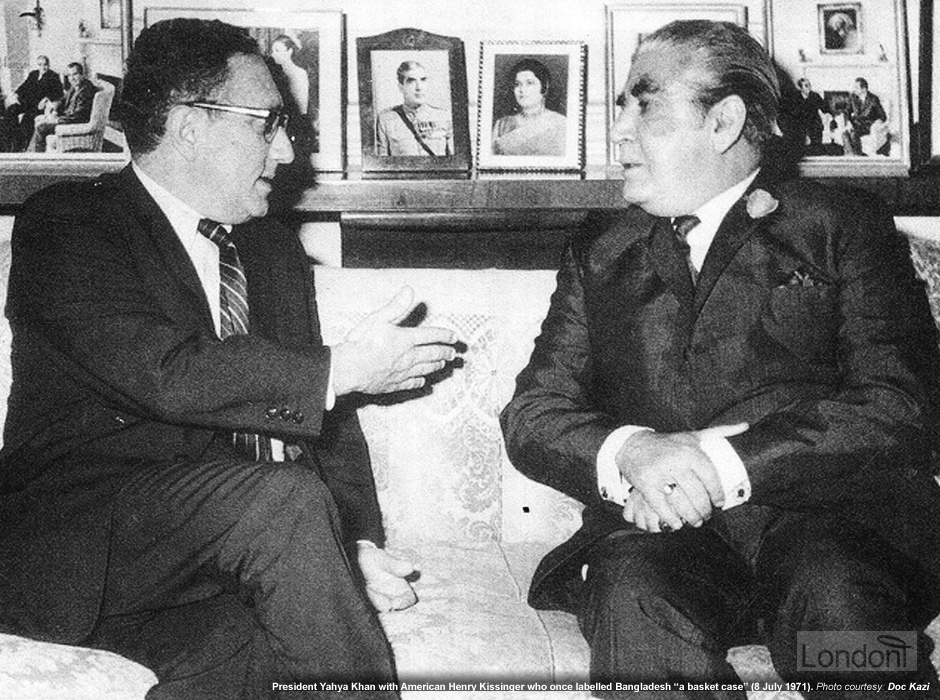
Legal Framework Order (LFO)
On 25 March 1970 Pakistan celebrated the 30th anniversary of the Muslim Resolution demanding a separate homeland in the then undivided India. The national day was celebrated with large scale military parades in major cities, including Karachi. President Yahya Khan took advantage of this 'Pakistan Day' by reaffirming the importance of unity of the country.
No power on earth can separate one from the other [i.e. East and West Pakistan].
...I have no doubt in my mind that our armed forces will maintain their fine traditions and will be ready to lay down their lives in the discharge of their sacred duty of guarding the frontiers of Pakistan.
President Yahya congratulates country's armed forces for successfully countering every threat to Pakistani security (25 March 1970)
Five days later, on 30 March 1970, President Yahya formally issued the Legal Framework Order (LFO) of 1970 with a view to transferring power to the elected representatives. The LFO laid down the political principles and laws governing the 1970 general election and the structure and composition of the national and provincial assemblies. It was a detailed blueprint for the return to civilian government.
Guiding principles
The Legal Framework Order was constructed to safeguard the constitutional outcome and contained a set of principles with a view to maintaining national identity and unity. It defined how political parties should behave during the election and following the election results, how the Parliament would proceed with the constitution of Pakistan, and how the Prime Minister and the President would be determined for the country. Overall, it gave a mechanism of the ruling machinery.
The LFO declared that future Constitution should enshrine the following five principles:
- An Islamic ideology in which the Head of State should be a Muslim.
- Free periodical federal and provincial elections based on population and on universal adult franchise.
- The independence of the judiciary along with the guarantee of the fundamental rights of the citizens.
- The provision of maximum provincial autonomy in a federal system which would provide adequate powers to the Central Government to enable it to discharge its responsibilities in relation to external and internal affairs and the preservation of the territorial integrity of the country.
- Full opportunities to the people of all regions to participate in national affairs together with the removal by statutory and other measures in a specified period of economic and other disparities between provinces and regions.
Time limit and presidential powers
The National Assembly was obliged within 120 days of its first meeting to draw up a new constitution, which would permit maximum provincial autonomy. The President also reserved the right to "authenticate" the constitution by which if the National Assembly produced a Constitution not according to the broad principles of the LFO, he had the right to send it back to the Assembly for its reconsideration and even abrogate (remove) the entire Parliament. In this worst case scenario, the military will continue to adminstrator the country until next decision for transfer of power is devised.
The President also had the power to interpret and amend the Constitution, and his decision could not be challenged in a court of law. Each party leader was asked to sign the LFO and follow the guideline before competing in the election.
The sovereignty will be given to the National Assembly only when he has handed over the power. Until then everything is under cover and umbrella of Martial Law.
The loop-hole that Yahya created was with the LFO. The meaning of LFO was understood by the political parties. It was made public at a later date on 30 March 1970 for comprehension. General mass never paid attention to this document as it had nothing to do with the daily life of a person within Pakistan. Since political activities were not allowed at that time, thus, there was no remark about LFO published by the political parties. Yahya’s outline of LFO was Greek until it was available as a document.
...Justice A. R. Cornelius, a Catholic Christian from Punjab, engineered the content of the LFO though he does not come to the forefront. He was bottle partner of Yahya Khan and served nicely under Ayub Khan as the Supreme Court Chief Justice. Both Yahya and Cornelius became friends to a level that Cornelius protected the interest of Yahya as the President of Pakistan.
On 4 April 1970, President Yahya went to Dhaka to assess the political situation and meet the political leaders there. He assured them that the LFO was only 'a formality'.
The President's power of authentication was criticised in East Pakistan, but Yahya sought to allay fears during a visit to Dhaka early in April [1970]. He dismissed this as a 'procedural formality' and maintained that he was 'not doing all this for fun' but was earnest in his pledge to restore democracy. He also refused to countenance intelligence service reports both of Mujib's aim to tear up the LFO after the elections and establish Bangladesh and of India's growing involvement in the affairs of East Pakistan.
